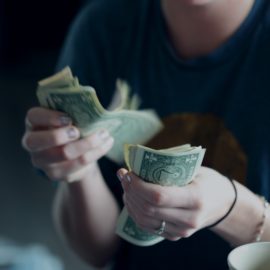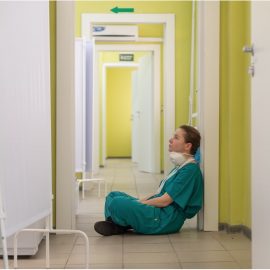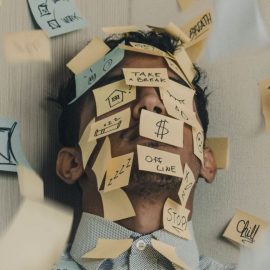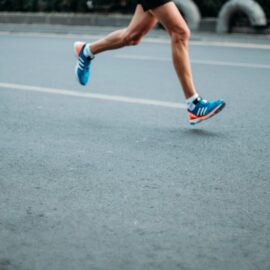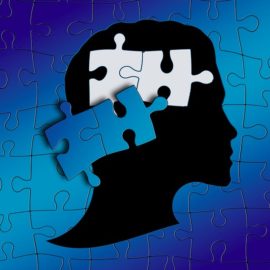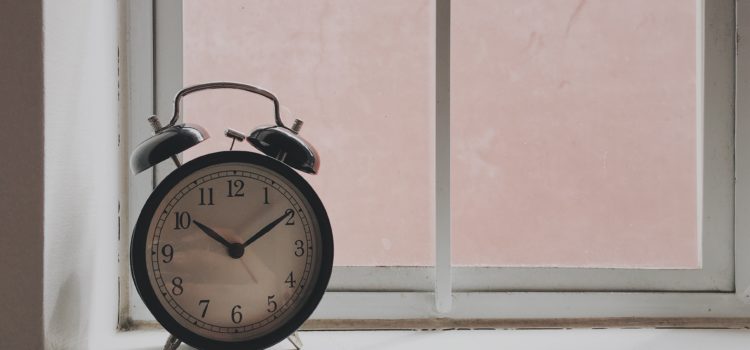
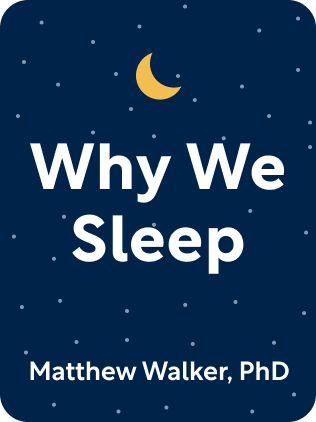
This article is an excerpt from the Shortform summary of "Why We Sleep" by Matthew Walker. Shortform has the world's best summaries of books you should be reading.
Like this article? Sign up for a free trial here .
What is circadian rhythm disruption? Is it bad for you?
Circadian rhythm disruption is when your sleep cycle is interrupted. A circadian rhythm disruption can have serious consequences; in addition to being tired, you may experience negative health side effects.
How Circadian Rhythm Works
What causes disrupted sleep? First, sleep is regulated by two mechanisms:
- The circadian rhythm, regulated by melatonin (produced by the suprachiasmatic nucleus in the brain). Think of this as a natural “wake drive,” making you stay awake during the day and waning during night.
- The circadian rhythm responds to light and darkness to calibrate itself. It’s naturally 14 hours and 15 minutes long on average.
- Adenosine is a fatigue signal and causes “sleep pressure.” This rises consistently throughout the day without sleep, making you feel more tired. Sleeping depletes adenosine, and you wake up with a lower level.
What Causes Circadian Sleep Disruption?
Now that you understand how sleep rhythm works, you can better understand how a circadian rhythm disruption is caused.
Caffeine blocks adenosine receptors, thus reducing how much you feel the “sleep pressure.” If you ever drink coffee and then feel a crash later, this comes from caffeine wearing off while adenosine keeps increasing throughout the day.
- Caffeine has a half-life of 5-7 hours, depending on genetics for the cytochrome P450 enzyme in your liver. Some people metabolize caffeine more quickly than others.
- Be careful when drinking decaf, as it apparently contains 15-30% of the caffeine in regular coffee – it’s nowhere near zero caffeine.
Jetlag causes circadian rhythm disruption
- Jetlag is usually worse when you fly eastbound because adjusting your schedule requires falling asleep when the body wants to be awake. This is more difficult than staying awake when your body wants to sleep.
- Since the circadian rhythm is slightly longer than a day, lengthening it is easier than shortening it.
How do you know if you have a sleep deficit? Here are a few signs:
- You don’t wake up naturally at the time you set your alarm – this means your body wants more sleep.
- When you read, you often lose track and need to read a sentence twice.
- You feel drowsy just a few hours after waking.
- You need coffee to feel functional.
Luckily, later in this book we’ll discuss how to improve your sleeping habits and reduce your sleep deficit.
Common Causes of a Circadian Rhythm Disruption
What causes disrupted sleep? Five influences have drastically changed how we sleep: caffeine, light, temperature, alcohol, and alarms. Each can cause circadian rhythm disruption.
Caffeine
This was already discussed in chapter 2. The tips, for good measure:
- Caffeine is of course in coffee, some soft drinks, and some teas, but also chocolate.
- Be careful when drinking decaf, as it apparently contains 15-30% of caffeine in regular coffee – it’s nowhere near zero caffeine.
- If you must have it, don’t drink it in the afternoon, and definitely not in the hours before sleep.
Light
Light is a signal for the suprachiasmatic nucleus to regulate the circadian rhythm (by signaling to the pineal gland to secrete melatonin). In the natural world, when the sun goes down, there’s little light. But nowadays, artificial light bathes our homes and disrupts our circadian rhythm.
Any light is disruptive to the circadian rhythm. Electric light delays your 24-hour circadian rhythm by 2-3 hours each evening.
- Even 8-10 lux (a measure of light intensity) delays melatonin release. A bedside lamp is 20-80 lux, and a typical living room is 200 lux, suppressing melatonin by 50%. (In comparison, the full moon only provides about 0.1 lux.)
- Light can suppress melatonin for days after usage stops.
Blue light is most problematic in causing a disrupted sleep cycle, suppressing melatonin at twice the levels of warm light. Blue light is most emitted by digital screens like TVs, computer monitors, and smartphones.
- We respond most to blue light because we evolved from marine creatures, and blue light penetrates water best.
- Reading on an iPad vs a book causes 50% less melatonin secretion and delayed the rise by 3 hours.
Tips:
- Dim lights in the rooms where you spend evenings.
- Maintain complete darkness throughout the night, using blackout curtains.
- Use settings on your phone and computers to tint the screen orange, reducing blue light.
- Consider yellow-tinted glasses that block blue light.
Constant temperature
Temperature also causes disrupted sleep. In natural environments, the temperature rises and falls with the day. This is used by the hypothalamus, along with light, to set the circadian rhythm. Our bodies react in kind — before sleep, the body cools, ejecting heat through densely perfused areas like hands, feet, and face.
But in modern days, we use thermostats to homogenize our temperatures, suppressing the highs in the day and raising the lows with pajamas and blankets. Our brain doesn’t get the same signal about the day’s cycle that it used to.
Cooling body temperatures improves sleep. In an experimental treatment, people wear a body suit that circulates cool water. Among insomniacs and the elderly, this reduces time to sleep and increases quality of NREM sleep.
Tips:
- The best temperature to sleep at with standard bedding and clothing is 65F, which is far lower than most people keep bedrooms.
- Try activities that help remove heat from the body:
- Hot bath before bed (expands capillaries, which after bath drops temperature)
- Splashing water on skin
- Sticking hands and feet outside blanket.
Alcohol
Alcohol causes a disrupted sleep cycle. Alcohol is a sedative, causing what appears to be sleep but is really more like anesthesia. It disrupts sleep by suppressing REM sleep and causing waking throughout the night. This is caused by aldehydes from alcohol metabolism.
Alcoholics are so sleep-deprived that their brain imposes REM-like behavior during wakefulness — hallucinations, scattered thinking. (Shortform note: an unfortunate vicious cycle can result here — alcohol disrupts sleep, which causes more fatigue and less behavior control when awake, which prompts more alcohol.)
By disrupting REM sleep, alcohol disrupts the normal processes of learning and complex knowledge.
- In an experiment, subjects were tasked with learning a new grammar on day 1. When exposed to alcohol on the first night, they lost 50% of memory recall compared to the abstinent group. Surprisingly, those getting alcohol on night 3 lost 40% – damage can occur for memories days past.
Tips:
- The author encourages total abstinence from alcohol, as puritanical as that sounds. A drink takes hours to fully degrade and excrete, and it’s even worse for people with alcohol flush reactions.
Alarms
Though you think you may need an alarm to wake up, alarms cause a disrupted sleep cycle. Alarms cause acute stress responses when you wake up, spiking cortisol, heart rate, and blood pressure. This is not good for you. Even worse, snoozing the alarm causes multiple stress responses in quick succession.
The best path to waking is natural, without alarms. Wake up at the same time of day every day. If you have to use an alarm, commit to waking up when you hear the alarm, to avoid snoozing.
“Life hacks” on how to defeat the snooze button are missing the point – rearrange your sleep so you wake up naturally.
Checklist for improving your sleep:
- Set a sleep schedule: sleep and wake up at the same times every day. Don’t sleep procrastinate, and don’t think that you can just sleep in on weekends (it makes it harder to wake up Monday morning)
- Don’t use alarms if you can help it. Alarms cause a huge stress reaction on waking. And snoozing causes repeated stress traumas every morning.
- Wake up with the sun or use very bright lights. This sets your circadian rhythm.
- Avoid all caffeine and nicotine if possible. But if you have to have caffeine, avoid it in the afternoon, since it takes over 10 hours to wear off fully.
- Exercise regularly, but not within 3 hours of sleep.
- Don’t nap after 3PM – this makes it harder to sleep at night.
- Don’t drink alcohol unless it is completely metabolized by sleep time (including the aldehydes produced).
- Avoid large meals and drinks late at night. Large meals can cause indigestion; too many fluids cause frequent urination.
- Reduce light before sleep. Blue light is the most harmful, but even bedside lamps cause issues. Artificial light delays the circadian rhythm by hours.
- Cool body temperature before sleep. The ideal sleeping temperature is 65F given standard bedding and clothes. Other tricks – expose your palms and feet while sleeping, take a hot bath before sleeping.
- Don’t rely on sleeping pills – these are usually just sedatives that put you more in a sedation state than sleep. Also, avoid medications that disrupt sleep.
- Don’t lie in bed trying to fall asleep for more than 20 minutes. Get up and do something until you feel sleepy. Anxiety will make it harder to fall asleep.
Cool future sleep-related ideas:
- In cars, detect sleep-deprived driving and react like drunk driving (shut it down, increase insurance premiums).
- Automated household that adjusts light and temperature to each person’s circadian rhythm.
- If one can induce sleep naturally, it might be possible to relieve insomnia, PTSD, and substance abuse
Circadian rhythm disruptions are often unavoidable parts of sleep. But you can work to reduce those circadian rhythm disruptions, and improve the overall quality of your sleep.

———End of Preview———
Like what you just read? Read the rest of the world's best summary of Matthew Walker's "Why We Sleep" at Shortform .
Here's what you'll find in our full Why We Sleep summary :
- Why you need way more sleep than you're currently getting
- How your brain rejuvenates itself during sleep, and why nothing can substitute for sleep
- The 11-item checklist to get more restful sleep today

